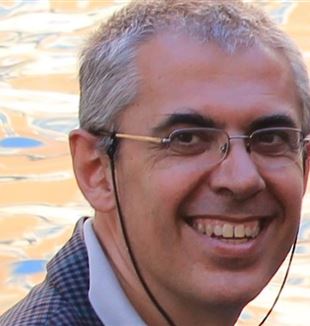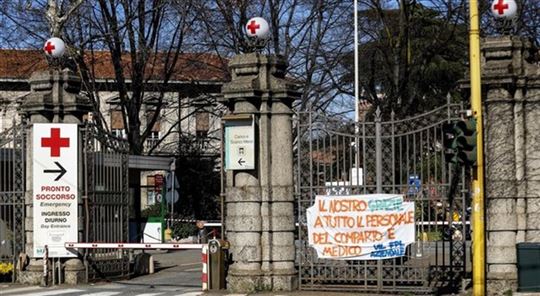
A day in the hospital ward
Expectation and hope in the hospital ward. From April Traces: The story of Amedeo Capetti, an infectious disease specialist at Sacco Hospital in Milan who has been fighting the epidemic on the front lines since it began.Friday, February 21. Amedeo Capetti, an infectious disease specialist at the Sacco Hospital in Milan, turned on his cell phone after the nursing students had finished their physiology exams. He found countless text messages expressing concern or asking questions, such as “What is happening?” “What do we do?” He went on the website of the region of Lombardy: the numbers indicated that the epidemic had begun. Patients from Codogno and Lodi were immediately transferred to Sacco. It was the beginning of the crisis that placed this Milanese hospital on the front lines. New intensive care units were opened in addition to more locations for patient intake.
Capetti is the head of the department that specializes in sexually transmitted diseases and provides treatment for about 600 patients who are HIV positive. While he tries to keep up with these responsibilities as much as possible, he finds himself immersed in the crisis, during his shift in the emergency room and in the ward. He told us his experience over multiple phone calls. In the first call, in the café during his break, he said, “To patients who say ‘health is everything,’ I have always said, ‘Look, that is a losing battle. Eventually we all die. Health is an instrument through which life can meet the One who gave it to us, the One who wanted us, so that we may obtain His beauty and greatness.’ This is even truer for me in times like these. What Fr. Giussani taught us and what Fr. Julian Carrón repeated in his article in the Corriere della Sera, which is the basis for a great companionship, is true. It is self-awareness, that is, a relationship with the infinite, that makes you pay attention to reality in every detail. You understand the importance of the brick that you are laying.” 
The first Sunday in the ward, all non-COVID 19 patients had to be released or transferred to create space for the wave of new arrivals. The last one remaining was an elderly man who was admitted with symptoms of possible pneumonia, though he actually may have a tumor. The instructions were to send him home as soon as his wife came for him. When his wife arrived, Amedeo explained to her the situation and offered support for in-home care. After he had finished, the woman confided, “I hope that he gets through this. He truly is a good man. I am much younger than he is, but when I met him, I understood immediately that he was special. I fell in love with him and I have loved him ever since.” That evening, while with his small group of friends of the Fraternity, he said, “Had I been in a rush to release him from the hospital, I would have missed this beautiful encounter.”
A few days later, a friend of Amedeo’s who is a nurse was tested positive for the virus and admitted to Sacco. Her family was in quarantine, so Amedeo’s wife said, “Let’s call them to ask if they need us to bring them groceries.” He went to visit her, but he could not stay long in her room for medical reasons, so every morning he brought pastries for her and the other patient in the room and left her a note. He began to do this with other patients, too, with “people that friends tell me about. I go as soon as I can or I call them. The greatest need of those who are very sick is medical care, while those who are not severely ill or are in quarantine feel trapped and are overcome by fear. Sometimes even a phone call makes a difference.”
Fear is the word that is repeated in the many phone calls, up to 150, that he receives daily. Most of those calling are his patients with HIV. They ask him how he is doing and want to chat. He is often forced to tell them that he will call them back because he does not have time to talk. “My response to fear is to follow the prevention guidelines, but also to never lose sight of the question of the meaning of life, to not close in on oneself, to not lose touch with friends, and to look out for those in need. Of course, this was easier before the situation forced everything to close and people to stay home. But people are creative. Limitations can spur the imagination. The patients feel the need to communicate their fears to me because they know I care about them. It has always been like this, even before the outbreak of coronavirus, and this is only possible because of the overflowing experience I have had in my life. I wake up in the morning and give thanks for the miracle of the new day. There is an expectancy in these circumstances that make beauty and hopefulness visible. This happens every day.”
One example is what happened with the restaurant employee at the university. One day, a friend of Amedeo’s told him that he wanted lasagna. Amedeo went to the university restaurant where hot meals are prepared, but they were only serving spaghetti with mussels. He ordered the spaghetti and when it came time to pay, the employee said, “These are on the house. It is the least I can do.” A few hours later he returned with a bouquet of flowers. Embarrassed, the female employee said, “You really shouldn’t have.” He replied, “This is gratitude, the same thing that moved you today at lunch, and it is the most beautiful thing in the world.”
Some patients, when conditions allow and they can be on their own, are sent home to stay in quarantine, to wait for the results of the test. Amedeo has accepted the task of calling over the weekend to share the results. “From the first visit, in a matter of minutes, you set the tone for your relationship with patients. An unexpected connection is born and it continues.” One day, Amedeo called the mother of a child who had been tested. The test result was positive and the boy had to return to the hospital. Amedeo offered to oversee his treatment. He asked the specialist who had been with the boy during watch to also take care of him. “As soon as he arrives, I will go say hello,” the specialist answered right away. “We did not know each other before that watch.” The boy became one of the patients he brings pastries to every morning.
In the morning when he first arrives, Amedeo writes down the names of all of the HIV-positive patients whose treatment he prescribes. He takes a picture of the list and sends it to his wife, who calls the patients to tell them where to buy lifesaving medicine because the hospital clinic is closed. One morning, at 5:30 a.m., she got up to have breakfast with him, and at noon she sent him an excerpt from the School of Community. “My heart has been widened. It was a caress from God. Carrón talked about ‘people whose lives show the signs of God’s victory, of His true and contemporaneous presence.’ For me, my patients have the faces of my friends whom I remember every day in the way I look at things. There are also the nuns of Martinengo, with whom I have been in touch since the beginning to find a way to take care of the children who come to their daycare center. Their joy and usefulness are a beacon of the presence of God. It does not come from them.”
Click here to read the April issue of Traces
Because there is no traffic, the commute to the hospital is just long enough for morning prayer. He holds in his heart his family, the sick, and those in need. “This way, the day begins with a different awareness. In this period, prayer becomes gratitude and curiosity.” In what way? “It is as if you saw the shadow of a person and asked yourself, ‘What does he look like?’ I experience wonder every morning when I face that shadow, asking for it to become present, that it reveal itself. At a certain point, I ask, ‘Who are you who enriches my life in this way?’ It is the cry that Carrón wrote about in the letter to the movement,” uttered when “circumstances become so challenging that we need to cry out to be able to face them.” #Coronavirus